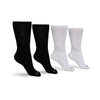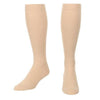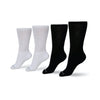Peripheral Edema - Causes, Symptoms, and Treatments

Table Of Contents:
Peripheral edema is a condition that causes swelling in the lower legs, ankles, and feet due to the accumulation of excess fluid. It can be caused by a variety of factors, from poor circulation to heart failure. This condition can be uncomfortable and even painful, so it is essential to understand the causes, symptoms, and treatments.
Causes of Peripheral Edema
Peripheral edema is often a sign of an underlying condition, and understanding the cause is key to effective treatment. Some of the most common causes of peripheral edema include:
- Poor circulation: Peripheral edema can occur due to poor circulation in the legs, which can be caused by several factors, including a sedentary lifestyle, varicose veins, or deep vein thrombosis.
- Heart failure: Heart failure can cause fluid buildup in the body, leading to peripheral edema.
- Kidney disease: When the kidneys are not functioning correctly, fluid can accumulate in the body, leading to peripheral edema.
- Liver disease: Cirrhosis, a condition that damages the liver, can lead to peripheral edema
- Pregnancy: During pregnancy, the body produces more blood, which can put pressure on the veins in the legs, leading to peripheral edema.
Symptoms of Peripheral Edema
The symptoms of peripheral edema can vary depending on the underlying cause. However, some common symptoms include:
- Swelling in the legs, ankles, or feet
- Stiffness in the affected area
- Pain or discomfort in the affected area
- Skin that is stretched or shiny
- Difficulty walking due to the swelling
If you are experiencing any of these symptoms, it is essential to consult with your doctor for proper diagnosis and treatment.
Treatment
The treatment of peripheral edema involves addressing the underlying cause of the condition. The primary goal of treatment is to reduce swelling and inflammation, alleviate pain, and improve circulation. Some common treatments for peripheral edema include:
- Compression Therapy: This therapy involves wearing elastic stockings or wraps that put pressure on the legs and reduce swelling. It is an effective treatment for mild to moderate peripheral edema.
- Medications: Doctors may prescribe diuretics (water pills) to reduce fluid retention in the body. Anticoagulants may also be prescribed to prevent blood clots from forming.
- Lifestyle Changes: Making changes to one's lifestyle can help reduce the risk of developing peripheral edema. For example, maintaining a healthy weight, regular exercise, and a healthy diet can help prevent fluid buildup in the legs.
- Surgery: In some cases, surgery may be necessary to correct an underlying condition that is causing peripheral edema. For example, if a blood clot is causing the edema, surgery may be required to remove the clot.
Prevention
Peripheral edema can be prevented by taking some simple steps. These include:
- Maintaining a healthy weight: Excess weight puts pressure on the legs and can lead to fluid buildup.
- Exercising regularly: Regular exercise helps improve circulation and reduces the risk of fluid buildup in the legs.
- Elevating the legs: Elevating the legs above heart level helps reduce swelling and improves circulation.
- Avoiding prolonged sitting or standing: Sitting or standing for long periods can put pressure on the legs and lead to fluid buildup.
- Wearing comfortable shoes: Wearing comfortable shoes that fit well can reduce the risk of foot and ankle swelling.
Conclusion
Peripheral edema is a common condition that affects many people. It is caused by a variety of underlying conditions and can be a symptom of a more serious health problem. The most common cause of peripheral edema is fluid buildup in the legs due to poor circulation, heart failure, or liver disease. Other causes include medication side effects, pregnancy, and injury. Symptoms include swelling, pain, and stiffness in the affected area. Treatment involves addressing the underlying cause of the condition and may include compression therapy, medication, lifestyle changes, or surgery. Prevention involves maintaining a healthy weight, regular exercise, elevating the legs, avoiding prolonged sitting or standing, and wearing comfortable shoes. If you experience symptoms of peripheral edema, it is important to speak with your doctor to determine the underlying cause and appropriate treatment.

2 comments
Best Sellers
-
Men's Cotton Diabetic Crew Socks (6 Pair)
![]()
- Regular price
- $39.99
- Sale price
- $39.99
- Regular price
-
$79.95 - Unit price
- per
Sold out





-
Men's Ultra-Soft Upper Calf Diabetic Socks (4 Pair)
![]()
- Regular price
- from $39.99
- Sale price
- from $39.99
- Regular price
-
$79.95 - Unit price
- per
Sold out


-
Men's Cotton Diabetic Ankle Socks (6 Pair)
![]()
- Regular price
- $39.99
- Sale price
- $39.99
- Regular price
-
$69.95 - Unit price
- per
Sold out


-
Women's Cotton Diabetic Crew Socks (6 Pair)
![]()
- Regular price
- $39.99
- Sale price
- $39.99
- Regular price
-
$79.95 - Unit price
- per
Sold out




-
Women's Cotton Diabetic Ankle Socks (6 Pair)
![]()
- Regular price
- $39.99
- Sale price
- $39.99
- Regular price
-
$79.95 - Unit price
- per
Sold out


-
Men's Over The Calf Compression Stocking Socks (1 Pair)
![]()
- Regular price
- from $19.99
- Sale price
- from $19.99
- Regular price
-
$31.95 - Unit price
- per
Sold out





-
Women's Ultra-Soft Upper Calf Diabetic Socks (4 Pair)
![]()
- Regular price
- from $39.99
- Sale price
- from $39.99
- Regular price
-
$79.95 - Unit price
- per
Sold out


-
DSC Hemp Cream For Neuropathy Aches & Nerve Pain (Peppermint)
![]()
- Regular price
- from $39.99
- Sale price
- from $39.99
- Regular price
-
$59.95 - Unit price
- per
Sold out









Do you have compression socks for diabetics? Takes too long to place order.
Do you have compression socks for diabetics,0